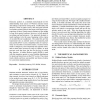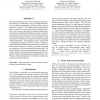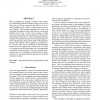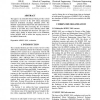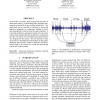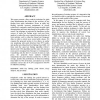ISMIR
2005
Springer
14 years 6 months ago
2005
Springer
Harmonic analysis is a standard musicological tool for understanding many pieces of Western classical music and making comparisons among them. Traditionally, this analysis is done...
ISMIR
2005
Springer
14 years 6 months ago
2005
Springer
One of the important challenges facing music information retrieval (MIR) of audio signals is scaling analysis algorithms to large collections. Typically, analysis of audio signals...
ISMIR
2005
Springer
14 years 6 months ago
2005
Springer
Audio search algorithms have reached a degree of speed and accuracy that allows them to search efficiently within large databases of audio. For speed, algorithms generally depend...
ISMIR
2005
Springer
14 years 6 months ago
2005
Springer
This paper introduces a novel way to detect metrical structure in music. We introduce a way to compute autocorrelation such that the distribution of energy in phase space is prese...
ISMIR
2005
Springer
14 years 6 months ago
2005
Springer
When considering the problem of audio-to-audio matching, determining musical similarity using low-level features such as Fourier transforms and MFCCs is an extremely difficult ta...
ISMIR
2005
Springer
14 years 6 months ago
2005
Springer
er is an extended abstract which provides a brief preliminary overview of the 2005 Music Information Retrieval Evaluation eXchange (MIREX 2005). The MIREX organizational framework...
ISMIR
2005
Springer
14 years 6 months ago
2005
Springer
A segmentation strategy is explored for monophonic instrumental pitched non-percussive material (PNP) which proceeds from the assertion that human-like event analysis can be found...
ISMIR
2005
Springer
2005
Springer
Ringomatic: A Real-Time Interactive Drummer Using Constraint-Satisfaction and Drum Sound Descriptors
14 years 6 months ago
We describe a real-time musical agent that generates an audio drum-track by concatenating audio segments automatically extracted from pre-existing musical files. The drum-track c...
ISMIR
2005
Springer
14 years 6 months ago
2005
Springer
Supervised learning can be used to create good systems for note segmentation in audio data. However, this requires a large set of labeled training examples, and handlabeling is qu...
ISMIR
2005
Springer
14 years 6 months ago
2005
Springer
This paper presents a fuzzy analysis technique for pitch class determination that improves the accuracy of key finding from audio information. Errors in audio key finding, typical...
